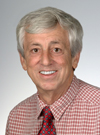|
by Cindy Abole
Public Relations
MUSC lost a
valued colleague, researcher and
mentor April 28 with the death of
George Cooper IV, M.D.,
Distinguished University Professor
of Medicine and director of the
Gazes Cardiac Research Institute.
 Dr. George Cooper IV Dr. George Cooper IV
An
internationally renown expert in
heart physiology and heart failure
research, Cooper was professor of
medicine in the Department of
Internal Medicine. Cooper was
chief of cardiology at the Ralph
H. Johnson Veterans Affairs (VA)
Medical Center and appointed to
director of Gazes Institute in
1994.
M. Rita Young,
Ph.D., associate chief of staff
for research at the Ralph H.
Johnson VA Medical Center, valued
Cooper's career and experience
that was helpful to junior
research faculty on campus.
"George was a
VA investigator for the past 25
years, with his VA research
focusing on the causes of heart
failure, a significant problem in
the aging veteran population. He
was a passionate researcher and a
highly respected mentor for junior
scientists, faculty, clinicians
and students. As both a VA
researcher and chief of cardiology
at the VA Medical Center, George
was truly dedicated to advancing
the health of veterans."
Cooper grew up
in Alexandria, Va., and received
his bachelor's degree in 1964 from
Williams College and medical
degree in 1968 from Cornell
University Medical College in New
York. He completed his internal
medicine training at Case Western
Reserve University in Cleveland,
Ohio, and research and cardiology
fellowships at the Mayo Clinic and
Duke University Medical Center. He
also conducted research at the
Naval Medical Research Institute
in Bethesda, Md.
During his
career, he authored more than 80
scientific articles and 10 book
chapters in the field of cardiac
mechanics and served on editorial
boards of major cardiology
journals and specialized boards
with the National Institutes of
Health and Veteran's
Administration.
Gazes Cardiac
Research Institute acting director
and colleague Donald R. Menick,
Ph.D., praised Cooper for his
leadership, vision and compassion
to improve cardiac care. "George
had a great passion for promoting
cardiovascular research. Most
importantly, he wanted to ensure
what he discovered in the lab made
a difference in his patient's
lives. To this end, he brought
together talented clinical and
basic scientists focused on
understanding and treating heart
disease, which became the Gazes
Cardiac Research Institute. He has
had a great impact on all of us
who worked with him and on
research here at MUSC."
Julius Sagel,
M.D., Division of Endocrinology,
Diabetes and Medical Genetics and
former head of the medicine
service at the VA Medical Center,
has worked with Cooper at MUSC and
the VA hospital for almost 30
years.
"I was
associated with Dr. Cooper since
his arrival to MUSC and the VA
Medical Center. I gained enormous
respect for his intellect,
scientific productivity and
ability to guide the careers of
young faculty. Dr. Cooper was able
to develop a very strong
cardiology section and helped
strengthen the affiliation between
both institutions. In addition to
his highly successful research
career, he also dealt
appropriately with clinical
issues."
Cooper is
survived by his wife, Elizabeth
Roemig Cooper, and sons, George,
F. Cullen, William Wise, James
Andrew and other family.
Tommy Gallien,
lab manager in Gazes Cardiac
Research Institute, said that
everyone will miss his
contributions and research
insight.
"George's
initial curiosity as an intern
was: 'Why doesn't the heart grow
sufficiently to correct for
problems presented by hypertension
and other cardiac diseases?' He
spent his 27 year career at MUSC
in pursuit of the answers and
founding a diverse and
distinguished research team to
seek new therapies in treating
cardiovascular disease. He was
particularly proud of treating our
veteran population.
Stephen Lanier, Ph.D., associate
provost for research, said Cooper
established and led a
well-recognized, research program
that focused on the mechanisms of
heart failure that had a broad
impact on the field over a
sustained period of time. "His
perspective as a cardiologist and
basic scientists allowed him to
nurture an integrated,
well-grounded research program
that touched upon molecular and
functional aspects of cardiac
biology associated with heart
failure, which was truly a special
feature of the program."
Memorials may
be made to St. Michael's Episcopal
Church, 71 Broad St., Charleston,
S.C., 29401 or the Gazes Cardiac
Research Institute at MUSC, 18 Bee
St., Charleston, S.C., 29401.
|



